Orban Meets Francis
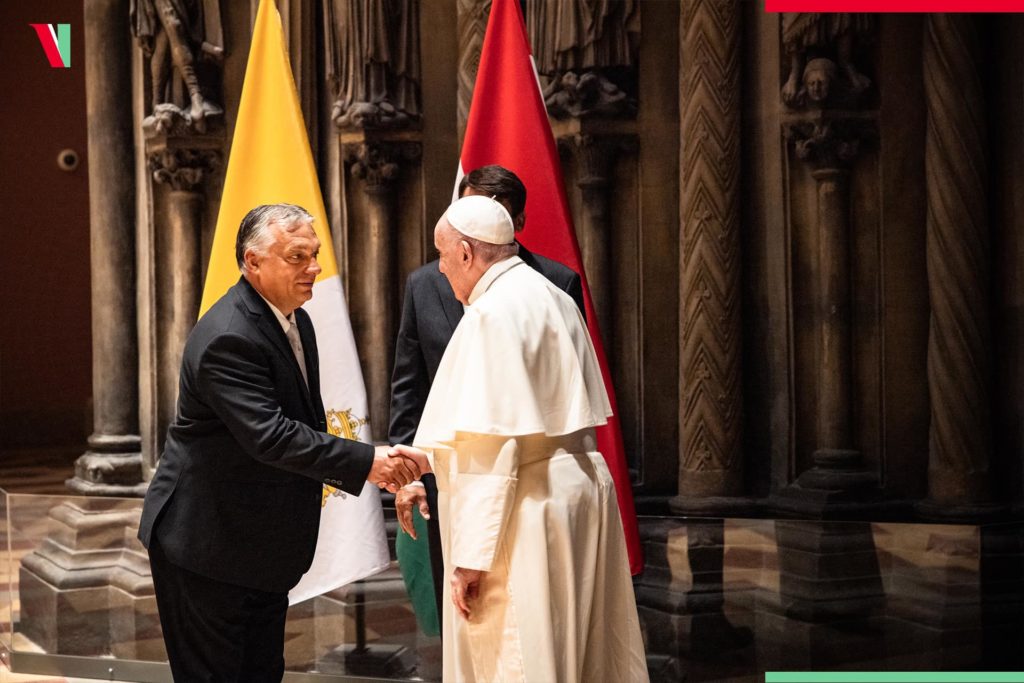
Interesting, this:
PM Orbán met Pope Francis and presented a letter that King Béla IV wrote for Pope Innocent IV in 1250. The King warned of the looming threat of the Tatar invasion and called for the unity of Europe. He was ignored. 35 yrs later HU fended off the Tatars with great bloodshed. pic.twitter.com/PS8JPTJ4my
— Balázs Orbán (@BalazsOrban_HU) September 12, 2021
Here is the text of that letter:
To the most holy father in Christ and Lord Innocent, by divine providence Supreme pontiff of the Holy Roman and Universal Church, Béla, king of Hungary by the same grace, with the respect both due and devoted.
Most of the kingdom of Hungary has been reduced to a desert by the scourge of the Tartars, and it is surrounded like a sheepfold by different infidel peoples like the Ruthenians and the Brodniks on the eastern side and the Bulgarians and Bosnian heretics against whom we have been fighting until now with our armies on the southern side. On the western and northern side there are Germans, from whom, because of our common faith, our kingdom should gain the fruit of some aid. However, it is not any fruit, but rather the thorns of war that our land is forced to endure as they snatch away the wealth of the country by unexpected plundering.
For this reason—and especially because of the Tartars, whom the experience of war has taught us to fear in the same way as all the other nations that they have passed through have learned—after having asked for advice from the prelates and princes of our kingdom, we hasten to flee to the worthy vicar of Christ [the pope] and to his brethren, as to the sole and very last true protector of Christian faith in our ultimate need, so that what we all fear will not happen to us, or rather, through us, to you and to the rest of Christendom.
Day after day news of the Tartars come to us: that they have unified their forces—and not only against us, with whom they are the most enraged, because we refuse to submit to them even after all that injury, while all the other nations that they put to the test became their tributaries, especially the regions which are at the east of our kingdom, such as Russia, the countries of the Cumans and the Brodniks, and Bulgaria, which in large part had once belonged to our dominion. It is rather against the whole of Christendom that their forces are unified, and, insofar as it is deemed certain by several trustworthy people, they have firmly decided to send their countless troops against the whole of Europe soon.
Thus, we are afraid that, if their people arrive, our subjects will be unable or even unwilling to withstand the cruelty of the Tartar ferocity in battle and, against our will, guided by fear, they will end up by submitting to their yoke, just as the above-mentioned neighbors have already done, unless by its careful consideration the farsighted Apostolic see securely and powerfully fortifies our kingdom in order to comfort the peoples living in it.
Indeed, we write this letter principally for two reasons: not to be accused of having shirked what is possible, and not to be considered negligent.
As far as what is possible is concerned, we say that we can conclude after our experience that we did whatever was possible when we exposed ourselves and all we had to the heretofore unknown men and capabilities of the Tartars. As for negligence, we can by no means be accused of it. For, while the Tartars were still fighting against us in our country, we turned to the three principal courts of Christendom seeking help in this affair, namely yours, which is believed and held by Christians to be the highest and master of all the courts; [and we turned to the court] of the emperor, to whom we even declared that we would be ready to submit ourselves if, during the time of the above-mentioned scourge he would have given us valid assistance and help; and we also turned for help to the court of the Franks.
But from all of them we received neither encouragement nor support, only words. In fact, we had recourse to all that was ours and, for the profit of Christendom, we humiliated our royal majesty and gave two of our daughters in marriage to two Ruthenian dukes and the third one to a Polish duke, aiming to learn through them and other friends of ours in the Eastern parts all the secret news about Tartars, so that this way we might face them and resist in a more suitable way their intentions and fraudulent schemes. We even received the Cumans into our kingdom, and—for shame!—today we defend our kingdom with pagans and put down the infidels of the Church with the help of pagans.
Moreover, in order to defend the Christian faith, we have joined by marriage our first-born son to a Cuman woman, in order to avoid the worst, and to have the possibility to create some occasion to bring them to the baptismal font—as we have already done more than once.
So for all these and other reasons we very much hope that it is clear to the Sanctity of your Supreme pontiff, that in these oppressive times we have received no useful aid from any prince or people of the whole Christian Europe, with the exception of the knights Hospitaller in Jerusalem, whose brothers at our request have recently taken up arms against the pagans and the schismatics in defense of our kingdom and the Christian faith. We have already placed part of them in a very dangerous spot, namely in the neighborhood of the Cumans and the Bulgars beyond the Danube, in the area through which the Tartar army found its way to us at the time of the invasion of our kingdom. Regarding that region, we hope and intend that, if God helps our acts and those of the above-mentioned Hospitallers, the Apostolic See may find them sufficiently worthy to grant them its favor. Just as the Danube stretches to the sea of Constantinople, so we can succeed through them to propagate progeny of the Catholic faith, and thus they may bring useful aid to the Roman empire and also to the Holy Land.
We have installed another part of them in the middle of our country, to defend the castles that we are constructing around the Danube, because our peoples are not accustomed to do this. For, after more than one discussion, our council decided that it would be more beneficial to us and to the whole of Europe to safeguard the Danube by fortifications: the Danube is the water of resistance. It was here that Heraclius met Chosroes when he defended the Roman empire, and it was here that we resisted—entirely unprepared, and thus badly injured—the Tartars for ten months, while our kingdom was still almost completely lacking fortifications and defenders.
Because if—God forbid!—this territory were possessed by the Tartars, the door would be open for them to [invade] the other regions of the Catholic faith. This is in part because there is no sea to hamper their passage from here to other Christians, and in part it is because they can settle their families and animals—in which they abound—marvelously well here, better than elsewhere. Attila may serve as an example of someone who, coming from the East to subdue the West, established the center of his authority in the middle of the kingdom of Hungary. On the other hand, the emperors, who came fighting from the West in order to subdue the East, laid down their frontiers inside our country, however much they did for the organization of the army.
May your pontifical Sanctity, pondering all this, find us worthy to procure a medicine before the wound rots. Indeed the multitude of wise people is very surprised that, in the present state of affairs, your Paternity permitted the departure of the king of France, such a noble member of the Church, from the frontiers of Europe.
The multitude is wondering and cannot cease to be amazed at the fact that your Apostolic Clemency offers substantial help to the empire of Constantinople and regions overseas, which, if they were lost—God forbid!—would not harm the inhabitants of Europe as much as if our kingdom alone passed into the possession of the Tartars. We take God and man as our witness that our necessity and the gravity of our situation are so great that, if the various dangers of the roads did not prevent us, we would send not only messengers, as we have done so far, but would personally come as a servant and fall down at your feet to proclaim before the face of the whole Church—so that we may be justified and excused—that, if your fatherly sanctity does not send us help and the need becomes overwhelming, against our will, we may reach an arrangement with the Tartars.
So we humbly beseech you that the Holy Mother Church consider, if not ours, at least the merits of our predecessors, the holy kings who, full of devotion and reverence submitted themselves and their people, preaching to them the orthodox faith, and serving you with purity of faith and in obedience. That is why the Apostolic see promised to them and to their successors all grace and favor if any necessity threatened, at a moment when they did not even ask for it, as the course of things was prosperous for them.
Alas, now this heavy constraint seems to be imminent. Thus, open your fatherly heart, and in this time of persecution, extend your hand with the necessary support for the defense of the faith and for the public utility. Otherwise, if our petition—which is so necessary and so universally favorable for the faithful of the Roman Church—suffers a refusal (which we cannot believe) then we should be obliged by necessity, not like sons but like step-sons, excluded from the flock of the father, to beg for aid elsewhere.
Dated in Patak the day of the bishop and confessor Saint Martin, III of the ides of November.
From the AP account of the Pope’s visit to Budapest:
Pope Francis urged Hungary on Sunday to “extend its arms towards everyone,” in a veiled critique of Prime Minister Viktor Orban’s anti-migrant policies as the pontiff opened a four-day visit to Central Europe, his first big international outing since undergoing intestinal surgery in July.
Francis, 84, appeared in good form during his short visit to Budapest, presiding over a lengthy Mass for a crowd organizers said reached 100,000 people. The pope stood and waved to crowds during a jaunt in his open-sided popemobile and used a golf cart to avoid walking long distances indoors, confessing at one point that he had to sit because “I’m not 15 anymore.” But otherwise he kept up the typical grueling pace of a papal trip despite his ongoing recovery.
Francis only spent seven hours in Budapest before moving on Sunday afternoon to a four-day tour of neighboring Slovakia. The lopsided itinerary suggested that Francis wanted to avoid giving Orban — the type of populist nationalist Francis frequently criticizes — the political boost that comes with hosting a pope for a proper state visit ahead of elections next spring.
Francis did meet upon arrival with Orban, whose refugee policies clash with the pope’s call for welcome and integration of those seeking better lives in Europe. While migration wasn’t on the stated agenda, Orban wrote on Facebook: “I asked Pope Francis not to let Christian Hungary perish.”
Orban has frequently depicted his government as a defender of Christian civilization in Europe and a bulwark against migration from Muslim-majority countries. Francis has expressed solidarity with migrants and refugees and criticized what he called “national populism” advanced by governments like Hungary’s. He has urged governments to welcome and integrate as many migrants as they can.
Francis, in his boundless liberal naïveté, would have been out there welcoming the Tartars, or Tatars, which is to say, the Mongols. It’s incredible how blind liberals can be to the way the world actually works. How can you look around Europe today, where crime from unassimilated and unassimilable migrants is booming, and think that an open-doors policy is a good thing? More to the point, how can Francis actually believe that welcoming hordes of migrants from the Muslim world into a Europe that is scarcely Christian can strengthen the Christian faith in Europe?
Why is the Calvinist Viktor Orban almost the only leader in Europe who sees this?
Here are excerpts from a piece in the current issue of Limen, the magazine of the Hungarian Migration Research Institute. The author is Tamas Deszo, the director of the institute:


More: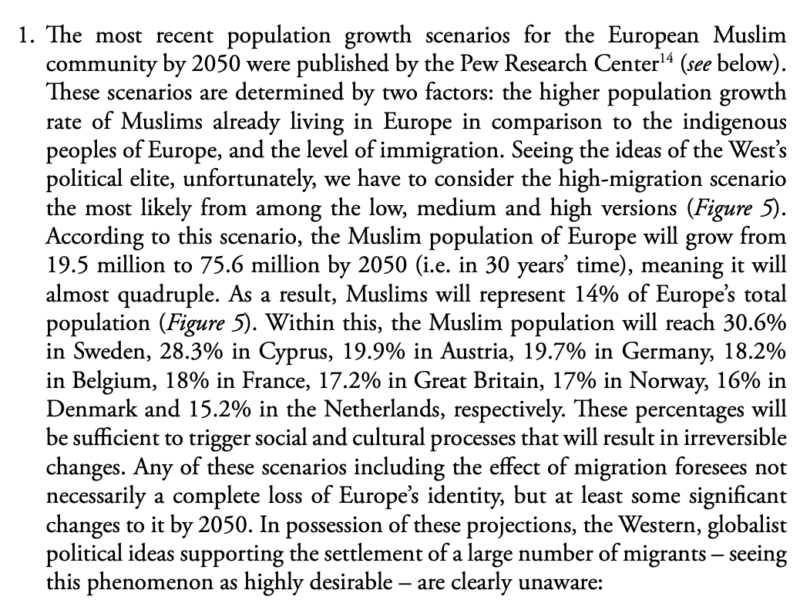
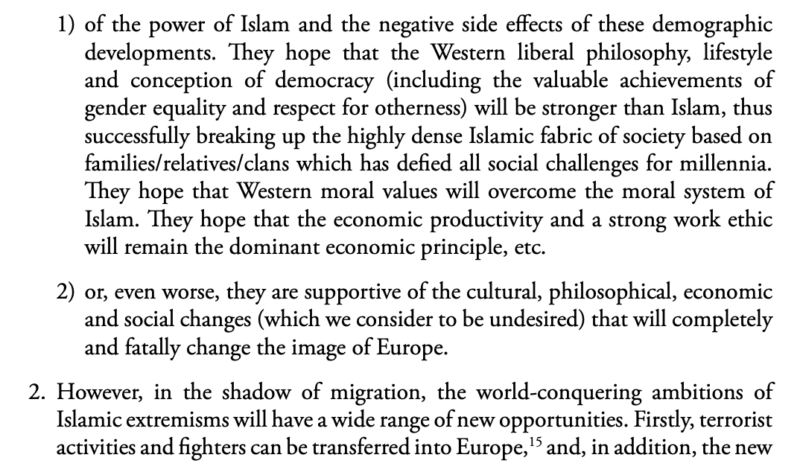
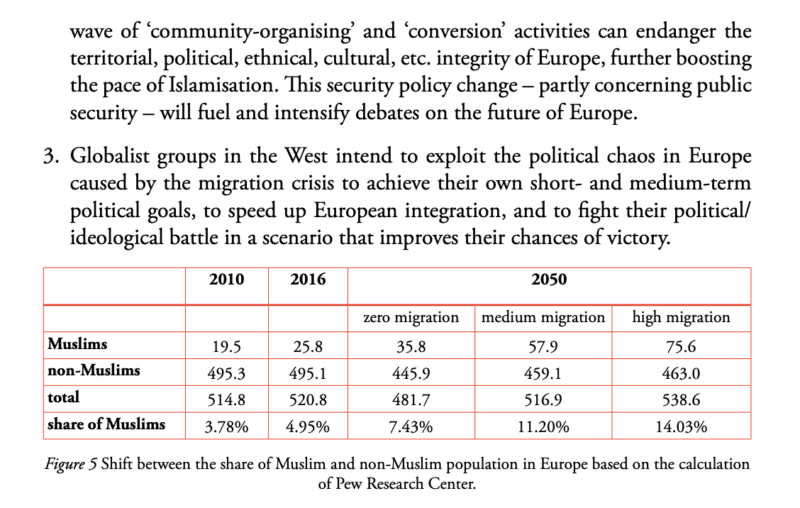
And: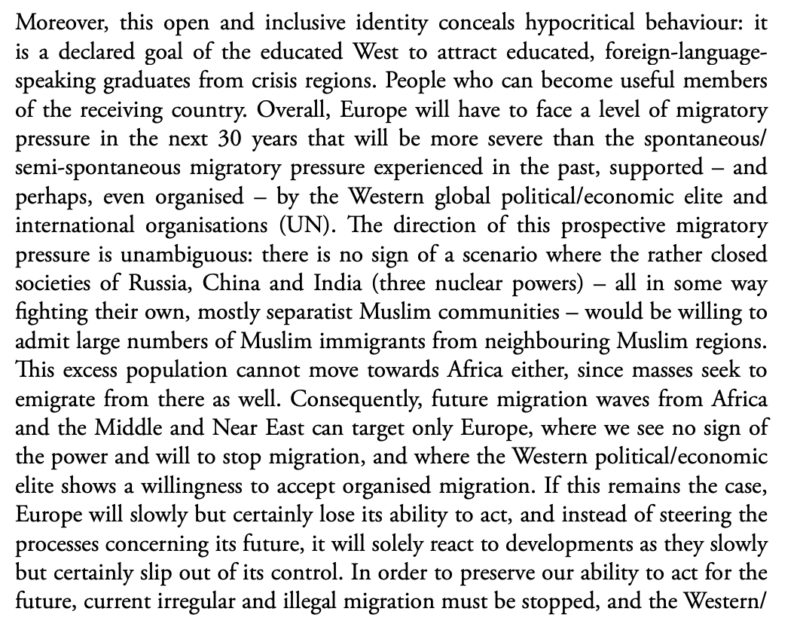
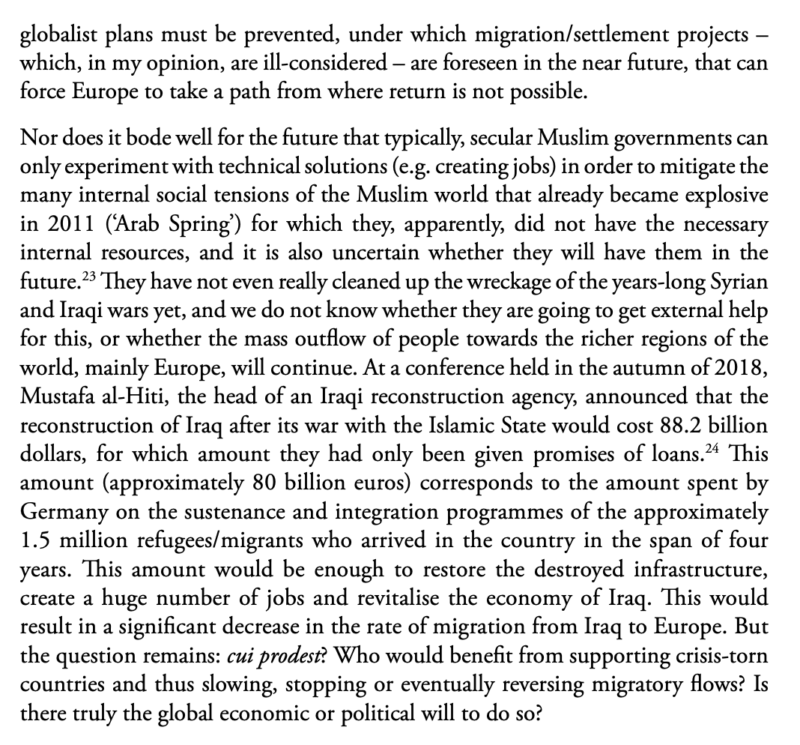
There’s a piece coming out in a few days in The New Yorker, about my passion for Hungary. I told the reporter that over the summer I spent in Budapest, I came to understand that Orban was a visionary, in the sense that he understands — unlike his Western European colleagues — what is actually at stake for Europe. Or as is more likely, they understand it, but only Orban is willing to do something about it — even if it ticks off the Pope.
By the way, you’ve heard of the Visegrad Group, right? It’s the name of the alliance of Hungary, Poland, Slovakia, and the Czech Republic. It was named after the Visegrad castle, where the leaders of the nations met in 1991 to form a mutual aid and friendship alliance after the fall of Communism. The castle was constructed by Bela IV to prepare for the second Mongol invasion. Bela also built fortified towns and forts throughout the country. When the Mongols (Tatars) came a second time, Hungary was able to defend itself.
There is a lesson in this history for us today. This is not a question of Orban or anybody else being big old meanies. This is a question of civilizational survival.
UPDATE: James C. comments:
As Pope Francis left his strongly guarded Vatican walls and boarded a flight to Hungary to lecture Orban about migrants, in Naples an Algerian illegal immigrant stabbed a woman to take her purse. She’s in hospital. In La Spezia, a Tunisian illegal immigrant attempted to rape a French tourist in the central train station. In Rimini, a Somalian illegal immigrant flew into a rage on a bus when asked for his ticket, stabbing 2 women on the bus before going out and attacking a family, slashing the throat of a 5-year-old child. The child is fighting for life in hospital.
These stories happen in Italy every day. Migrants make up a third of Italy’s prison population. Each of them had victims. Jorge Bergoglio is not and will not be a victim. He can continue to wag his finger from behind his walls and earn ever more contempt from Italian people for his cheap liberal utopianism.
Subscribe for as little as $5/mo to start commenting on Rod’s blog.